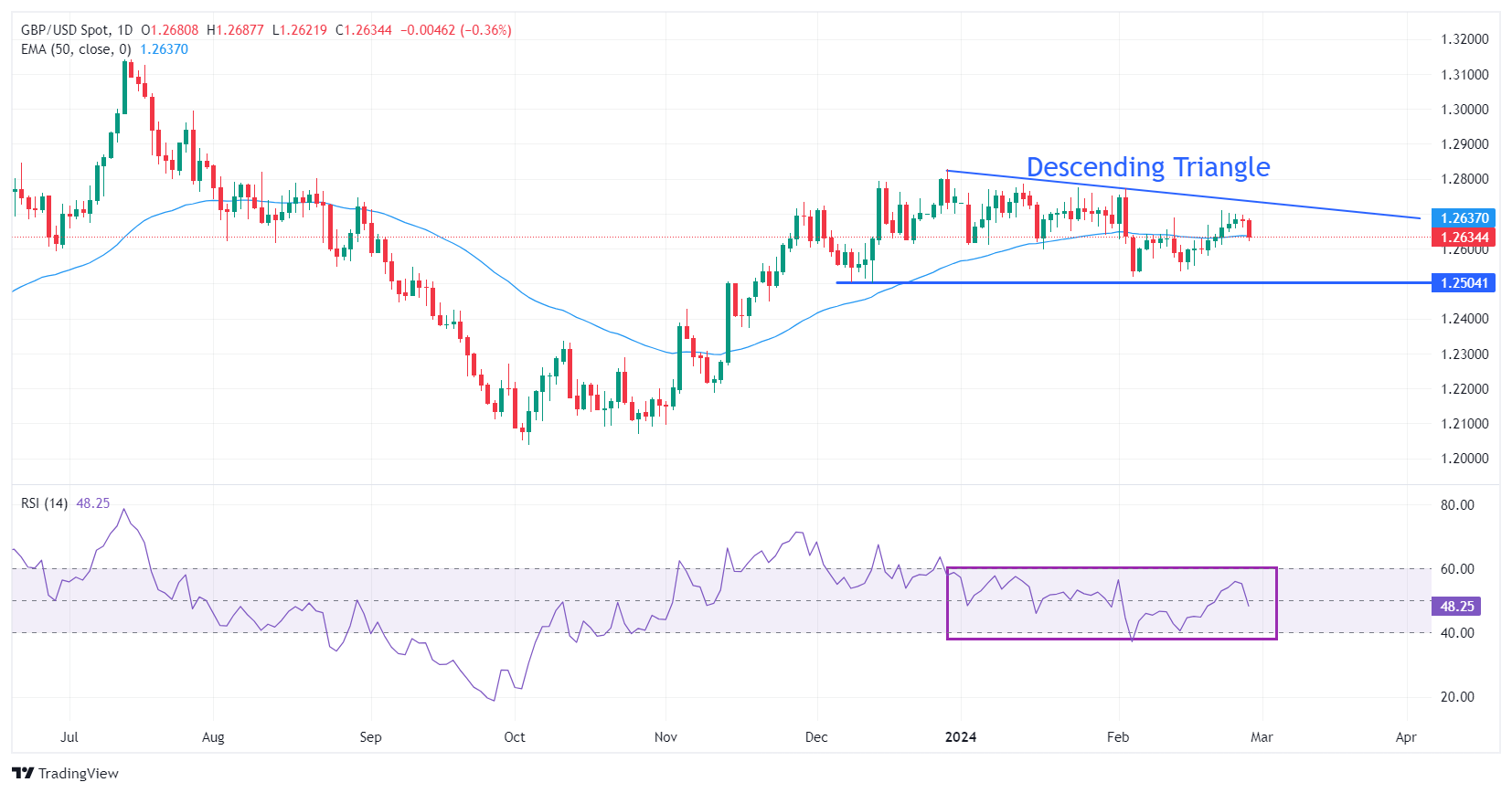- The British Pound faces heavy selling as market sentiment turns volatile.
- BoE's Dave Ramsden wants to see how long price pressures will persist.
- US Dollar advances ahead of Core PCE Price Index data.
The British Pound (GBP) weakens late in the European session on Wednesday as market sentiment remains volatile ahead of US Personal Consumption Expenditure (PCE) Price Index fundamental data for January. The GBP/USD pair retreats despite expectations that the Bank of England (BoE) will start cutting interest rates later than the Federal Reserve (Fed). This supports sterling, as higher interest rates tend to attract greater inflows of foreign capital.
Investors believe that the BoE will consider a change in monetary policy stance later than other central banks, as price pressures in the UK economy are tenacious due to high wage growth, which means an advantage for the Pound sterling. BoE policymakers have warned that the pace of slowdown in average earnings is half that needed to achieve price stability.
Looking ahead, the British pound will be guided by markets' expectations of rate cuts by the BoE. Stock investors expect the BoE to start reducing interest rates from August as this will support the broader stock market. This could be the moment when inflation shoots up again after having fallen to 2%, according to the BoE's forecasts, revealed in the latest monetary policy statement.
Daily summary of market movements: Sterling plummets after market discouragement
- The British Pound falls sharply after failing to recapture the resistance of the round 1.2700 level amid a cautious mood in the market.
- Investors are on the sidelines awaiting U.S. January Core PCE Price Index fundamental data due on Thursday.
- This crucial inflation data will give more clues about when the Federal Reserve (Fed) could start reducing interest rates.
- Forecasts from market participants show that core inflation data slowed to 2.8% from December's 2.9% year-on-year rate.
- The US Dollar Index (DXY), which values the dollar against six major currencies, rises to the crucial resistance of 104.00.
- Domestically, sterling will be guided by market expectations of rate cuts by the Bank of England.
- BoE policymakers are currently less interested in lowering interest rates as they need more evidence that inflation will fall to the 2% target.
- On Tuesday, BoE deputy governor Dave Ramsden, who voted to keep interest rates at 5.25% at the last monetary policy meeting, said he wants to see how long inflation will persist.
- Dave Ramsden added that the duration of inflation persistence will determine how long interest rates remain at 5.25%.
- Price pressures in the UK economy are stubborn due to higher wage growth and services inflation.
- These key inflation indicators have fallen sharply, but the pace of decline remains inconsistent, with inflation declining towards the 2% target.

The British Pound falls sharply after facing stiff resistance near 1.2700. The GBP/USD pair is constantly facing roadblocks near the descending boundary of the descending triangle pattern formed on a daily time frame, with the upper boundary line drawn from the December 28 high at 1.2827. Horizontal support of the triangle is drawn from the December 13 low near 1.2500.
A descending triangle pattern demonstrates indecision among market participants, but with a slight downward bias due to the formation of lower highs and flat lows.
The pair retreats towards the 20-day and 50-day EMA, which are trading around 1.2630. Meanwhile, the 14-period Relative Strength Index (RSI) remains within the 40.00-60.00 region, indicating a sharp contraction in volatility.
BoE FAQ
What does the Bank of England do and how does it impact the Pound?
The Bank of England (BoE) decides the UK's monetary policy. Its main objective is to achieve price stability, that is, a constant inflation rate of 2%. Its instrument to achieve this is the adjustment of basic loan rates. The BoE sets the rate at which it lends to commercial banks and at which banks lend to each other, determining the level of interest rates in the wider economy. This also influences the value of the British Pound (GBP).
How does the Bank of England's monetary policy influence the Pound Sterling?
When inflation exceeds the Bank of England's target, it responds by raising interest rates, which makes access to credit more expensive for citizens and companies. This is positive for the British Pound, as higher interest rates make the UK a more attractive place for global investors to invest their money. When inflation falls below target, it is a sign that economic growth is slowing, and the Bank of England will consider lowering interest rates to make credit cheaper in the hope that companies will borrow to invest in projects that generate growth, which is negative for the Pound sterling.
What is Quantitative Easing and how does it influence the Libra?
In extreme situations, the Bank of England can apply a policy called Quantitative Easing (QE). QE is the process by which the BoE substantially increases the flow of credit into a clogged financial system. QE is a policy of last resort when lowering interest rates does not achieve the necessary result. The process of QE involves the Bank of England printing money to buy assets, typically government bonds or AAA-rated corporate bonds, from banks and other financial institutions. QE usually results in a weakening of the British pound.
What is Quantitative Hardening and how does it influence the British Pound?
Quantitative tightening (QT) is the reverse of QE, and is applied when the economy is strengthening and inflation begins to rise. While in QE the Bank of England (BoE) buys government and corporate bonds from financial institutions to encourage them to lend, in QT the BoE stops buying more bonds and stops reinvesting the maturing principal of the bonds that you already own. It is usually positive for the British pound.
Source: Fx Street
I am Joshua Winder, a senior-level journalist and editor at World Stock Market. I specialize in covering news related to the stock market and economic trends. With more than 8 years of experience in this field, I have become an expert in financial reporting.







